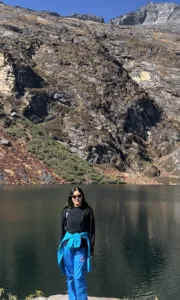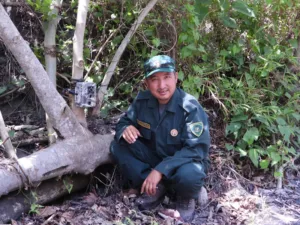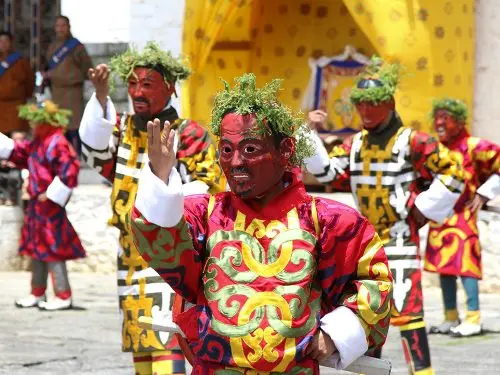Bhutan
Study Abroad in Bhutan
Have you ever wanted to spend time in the Himalayan mountains, hike through rhododendron forests dotted with brightly colored prayer flags, or observe graceful black-necked cranes and elusive mountain-dwelling takins?
Whether you’re an experienced traveler or looking for your first trip to another country, studying abroad is an important component of your college career. Living abroad gives you the opportunity to explore new places and learn about different cultures, gaining important global perspectives, discovering new things about yourself, and building lifelong friendships.
Our programs in Bhutan take place in the country’s mountains, valleys, rivers, forests, protected areas, and cultural sites. Courses and fieldwork focus on key environmental issues faced here such as natural resource and water management, climate change, and sustainable livelihoods. As the country begins to urbanize, and with the looming threat of a rapidly changing climate, Bhutan is at a crossroads. In keeping with the tenets of Gross National Happiness, the people of Bhutan must balance preserving biodiversity with securing their economic futures. SFS works in partnership with the Bhutanese government and the Bhutan Ecological Society to provide much-needed data that informs sustainable conservation and development policies and climate adaptation strategies.
Programs
Himalayan Environment and Society in Transition
See Program Costs
Program Costs
- Tuition
- Room & Board
- Total
Forests in the Land of the Thunder Dragon
See Program Costs
Program Costs
- Tuition
- Room & Board
- Total
Where You'll be Living
The Center is located at one end of the stunning Paro Valley, at the base of a towering ridgeline dotted with Buddhist monasteries. Campus is a small cluster of buildings designed in the traditional Bhutanese architectural style. A pleasant walk brings you to the markets, shops, and cultural events of Paro Town.
- Dorm living with two to four student rooms
- Classroom and dedicated study spaces
- Kitchen and dining hall, and on-site cooking staff
- Student lounge and ping-pong loft
- Verandas with scenic views of the valley
- Hiking trails and local roads for running
PRogram Costs
Study abroad is an investment in yourself – you’ll return home with new experiences, skills, knowledge, and friendships that will stay with you for the rest of your life. SFS program costs cover a variety of expenses, including:
- Pre-program advising and on-site orientation
- Tuition and research fees
- Housing at the field station and on excursions
- Daily meals and snacks
- Airport transfers (for arrival/departure)
- Field excursions and cultural activities
- Student success and wellness team on site
- 24/7 mental health and well-being support
- Emergency evacuation and repatriation insurance
- Official transcript processing
Financial Aid
We know cost can be one of the biggest barriers to studying abroad. At SFS, we’re committed to making our programs accessible to students which is why we award a generous amount in need-based financial aid each year. Our Admissions Team has worked with thousands of students and are here to answer your questions about the SFS aid process, aid available through your home school, and funding from external sources.
SFS Financial Aid: Need-based aid packages typically consist of a combination of scholarships, grants, and zero- and low-interest loans. SFS matches Federal Pell Grant funding for students applying to an SFS semester program.
Home School Aid: Be sure to ask your home school study abroad office or financial aid office what financial aid resources might be available to support your study abroad experience.
External Funding Opportunities: Organizations such as the Fund for Education Abroad or the Gilman International Scholarship Program award scholarships to students going abroad. These can be a great opportunity to reduce the cost of your program even more.
Research
In collaboration with our in-country partners, UWICER and BES, our research at the SFS Center for Climate and Sustainable Futures focuses on enhancing the condition of forest, river, and mountain ecosystems while balancing modernization and cultural preservation. Students contribute to this collaborative research agenda in several priority areas including mountain biodiversity and biogeography, climate change, sustainable forestry, conservation biology, water resources, socioeconomic development, human well-being, and public policy.
Our research focuses primarily on the following themes:
- Climate change
- Gross National Happiness
- Mountain ecology and biodiversity conservation
- Forest management
- Himalayan biogeography
- Agriculture, food systems, and development
- Tourism
Community
SFS is an active part of the Bhutanese community, where we have been operating programs for 10 years.
We have built long-term, collaborative relationships in the communities around the Center, and developed our research plans based on the environmental issues they and the surrounding ecosystems face. Throughout the program, students participate in a short homestay, join volunteer projects like stream clean-ups and environmental education programs, plant trees, attend tshechus (festivals), and play sports with Bhutanese students and monks.
At the end of each semester program, we host a Community Research Night where select students will present their research findings to the community. SFS research data is shared with the community, local NGOs, and the Bhutanese government.
Meet the Bhutan Team



Kuenga Wangmo, PhD









